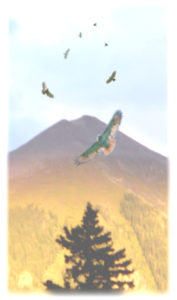I was originally intending to write this blog on the subject of the flow state. I was motivated as I’m scheduled to teach a class on the Flow State on July 16 depending on the state of… everything.
My usual process when writing an article is a great deal of research combined with distraction and procrastination. This time, just as I was ready to throw words down on the page, the COVID-19 pandemic flowed into our world.
This snowy afternoon, I’m sitting in my apartment to write, wondering what my heart and belly really want to say. I’m realizing that the COVID-19 pandemic is like the proverbial elephant in the living room blown up to exponential proportions.
I have to look at what’s happening with the pandemic. There are the sickened and the dead, the health workers risking their lives and their families’ lives with inadequate support and supplies. There’s the economic devastation of so many people who’ve lost jobs and businesses. There are oceans of uncertainty. There’s the ignorance, ego and politics within the White House.
It’s a really big elephant.
I’m resisting the temptation to chime in any more than I already have on the horrors, frustrations and consequences of the pandemic, or to spend a lot of time kvetching about the really messed up federal response. And I defer to what medical and science professionals and first line responders have to say. They have far more authority than I to talk about what’s going on.
Among all the bad news, there are so many amazing stories of how people are rising to help others, to support their communities, to take care of each other. Ironically the requirement for social distancing in many ways is bringing people closer. The importance of humanity and community is hitting “home” on a heart and gut level.
There are many useful articles and posts offering free advice and resources on ways to cope with the heightened anxiety, fear and grief of these times. I’m finding that in each very quiet day, I can find a YouTube or an article that helps me to navigate my head and heart through the wobbly moments.
In March a friend asked me how I was handling the pandemic. I said something like, “I’m keeping informed and following the guidelines, and otherwise I’m keeping my cool by dissociating.”
We chuckled at that.
Something this big is more than can really be comprehended, mentally or emotionally, so a bit of dissociation is a healthy response.
I thought I’d use the time to work more on some music I’m developing, jump onto the next blog, get industrious on meaningful projects. But I found myself binging on laziness. What I’m calling “binging on laziness” looks like a lot of sleep and a lot of drifting. I give priority to my deeply comforting meditative practices.
Without the annoying agenda of self improvement, I found myself studying a course for therapists from NICABM (The National Institute for the Clinical Application of Behavioral Science) on a variety of approaches for working with the “Never Good Enough” syndrome. And I’m giving more time to the clients and students that are hanging in there with me because I love them and their company.
Truth to tell, I don’t particularly plan to tighten up the floppy, sloppy ways I’m handling my stay-at-home time.
It’s an individual thing how we get through this time.
There’s a “motivational” message that’s been circulating during the coronavirus lockdown, which is supposed to kick our butts into gear since most of us now have more time on our hands.
Here’s an example:
“If you don’t come out of this quarantine with either:
- a new skill
- starting what you’ve been putting off like a new business
- more knowledge
You didn’t ever lack the time, you lacked the discipline”
So what? Pushing productivity is a great way to ignore the very real trauma that people are experiencing.
There is a time for the “Rah Rah let’s get it up” approach. That approach can be great, and depending on how it’s handled, can also be stupid. Particularly for people who are dealing with trauma. Shaming and trauma are a horrible combination.
Dr. Alaa Hijazi, a trauma psychologist, wrote this in a Facebook post that was shared 90,000 times:
“I thought I was spared the horrid ‘motivational’ phrase going around now—’If you don’t come out of this with a new skill, you never lacked time, you lacked discipline’—until I saw it on my local yoga studio page. As a trauma psychologist, I am utterly utterly horrified, enraged, and bewildered about how people can believe and spread this phrase in good conscience.
We are going through a collective trauma, that is bringing up profound grief, loss, panic over livelihoods, panic over loss of lives of loved ones. People’s nervous systems are barely coping with the sense of threat and vigilance for safety, or alternating with feeling numb and frozen and shutting down in response to it all.
People are trying to survive poverty, fear, retriggering of trauma, retriggering of other mental health difficulties. Yet, someone has the nerve to accuse someone of lack of discipline for not learning a new skill, and by a yoga teacher!
What we need is more self-compassion, more gentle acceptance of all the difficult emotions coming up for us now, more focus on gentle ways to soothe ourselves and our pain and the pain of loved ones around us. …It’s not hard to see how neither “time” nor “discipline” are our big problems right now.”
I agree with Dr. Hajazi. The last thing people who are suffering need are “positive” reasons to feel bad about themselves. Sure. It’s a good idea to stay healthy physically and psychologically. But watch out for the voice that says we have to measure ourselves against some performance metric, otherwise we’re behind the curve. Watch out for the subtle violence of expectation and judgment that can creep in through that demand. Self-compassion and kindness are more important than enhanced performance during these times.
If we’re drifting to the point where the lack of focus has become more nervous-making than fun, then it’s probably a good time to take some sort of action. Human beings have a very hard time with uncertainty and loss of control. It helps us to do something that gives us a sense of agency.
The action doesn’t have to be significant or heavy. It can be cleaning up the kitchen and paying some mind to what you’re going to cook. It may be stretching and moving to compensate for all of that stay-at-home sitting around. It could be any kind of exercise, with all of the physical, emotional and mental benefits that moving our bodies brings.
If you’re doing stay at home with your family, boy what a time to learn more about kindness, compassion and boundaries!
When the activities that have kept you occupied for most of your days aren’t any more, things may pop up from inside you that you thought you were done with, or at least had tucked away so you wouldn’t have to deal with them. You may get a chance to watch the dark side reruns on your inner YouTube. Be curious! Before you change the channel, have a chuckle at how you haven’t changed or how you have changed. Then do something nice for yourself.
Once again finding peace, finding center, becomes evermore important. When the forces that take us away from our peace are staring us in the face, then it’s time to dig deeper into our well of love and caring. Resilience, perseverance and grit need the resources of love, compassion and kindness.
It’s a good time to be kind to yourself, so you can be more kind to those around you.
Woo

